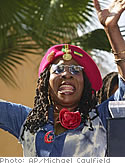Get Up, Stand Up! Rita Marley

Rita Marley (widow of Bob) has not only kept up the fight, she's bounced out of her late husband's shadow, taken an entire African nation under her wing, and kicked off a remarkable second act.
Rock star widows are supposed to fade into the California sunset, shopping on Rodeo Drive and faithfully seeing their plastic surgeons every other year. Rita Marley has gone a different route. The widow of reggae great Bob Marley has journeyed to Africa to help the people her husband sang about so piercingly. "To move forward," she says, "you have to return home."Rita was born and raised in the ghettos of Kingston, Jamaica, and was performing there as the lead singer of a group called the Soulettes when she met Bob Marley in 1964. Together they had four children while Marley stamped Jamaica's name on world music. His songs—sweetened by Rita's backup vocals—told of resistance, everyday courage, and the coming of a new day for Africa. But the king of reggae fathered seven children out of wedlock. The marriage was troubled. "The pain never really goes away," Rita says now. "It lingers, it lingers. Sometimes I talk to Bob in my mind and I say, How could you?"
But Rita stayed with her husband and attended the 1980 independence celebrations in Zimbabwe with him, one of the high points of his life before his death from cancer in 1981 at 36. Now 57, Rita has returned to the continent that Bob considered his true birthplace. She's bought a house in Ghana and put much of the money that pours in from his record sales to good use: In addition to supporting her 38 grandchildren, she has essentially adopted 34 Ethiopian children orphaned by AIDS, famine, and war, helping to provide for their education and everyday needs. For one Ghanaian village, her foundation built a clean water supply, classrooms, a day care center, and roads. It distributes basics like food, medicine, books, and toothbrushes.
"I felt like I was seeing my life over again when I first arrived in Ghana," Marley says. "I thought, This is part of me. I knew what it was like to be poor and hungry." She sees her clan's championing of African traditions as a way to show Ghanaians that their culture is the equal of any other. She plans to record African musicians in the studio she's building. "Here they have the rhythm that lifts you up off the ground," she says. "This is where reggae got its soul."
Along with her projects in Ghana and work on a new reggae album called Sunshine After Rain comes a memoir, No Woman No Cry, out this month. "I never really got the chance to scream about some of the painful things," Marley says. "In the book, I look at my whole life experience, at ego and fame, too. So much has been written about Bob and me, but this will be the truth."
Having come to terms with her past, Marley is looking forward to years of hard but rewarding work in Africa. Like Bob said, 'Don't give up the fight.'"



